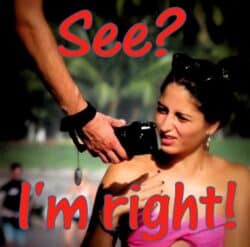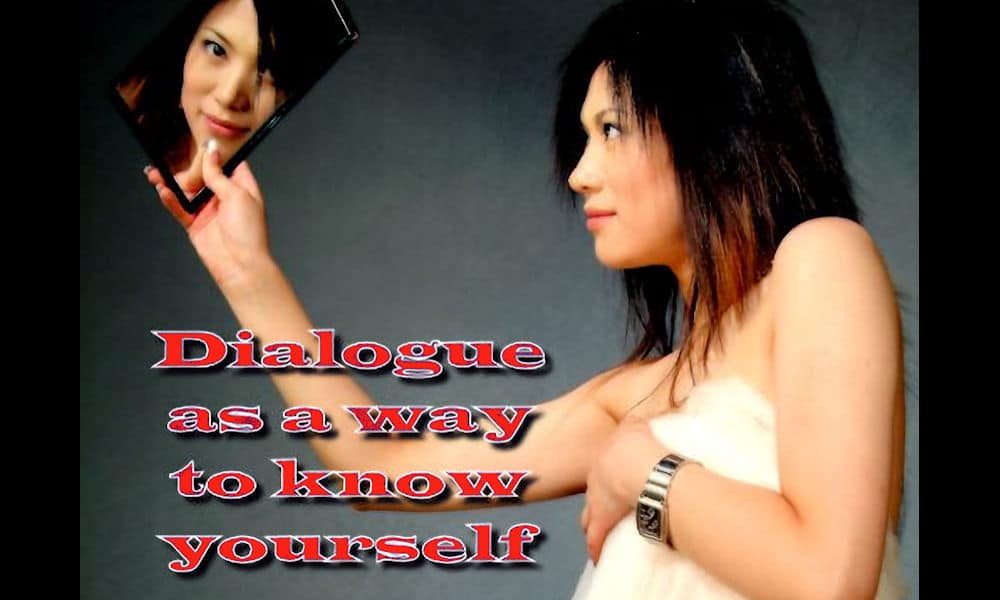Communicate Better: Dialogue is a tool for self-exploration. It’s not a way to get others to behave, but rather a way to learn about yourself.

Psst!! Hey!!!
** Want more great writing designed to help YOU to shift your behaviour?
** Want to learn how to find, build or deepen your principal relationship?
** Want to know more about Zen living and being?
Check out Wayne’s books! (amazon link)
Or, check them out right on our site.
I’ve written a ton of articles about communication and dialogue. I’ve focused on how to communicate better in all of my books, and can state categorically that good communication skills are absolutely essential for building and maintaining a relationship.
The key to inner exploration is the willingness to seek out and listen to feedback.
This comes with the caveat that the person you are
in dialogue with is worth listening to.

I once worked with a couple with terrible communication. We tried and tried, but they stayed stuck, and eventually separated. She returned periodically for whatever it was we did.
I could never figure out why she kept coming back,
because she didn’t absorb much of anything.
She’d let me talk for a bit, then she’d cut me off with:
- “I know that!” or
- “I’d already decided to do that before you said that.”
Pretty much, “I know everything, and it’s so weird that things never work out for me.”
My favourite exchange happened during her last session, which was several months after her separation. She’d called her ex, and it hadn’t gone well.
“I called him to check in on him, and he wouldn’t do what I said! I mean, he never listened to me when we were married, and now we’re separated, and he still won’t listen to me!”
It seemed to be beyond her to “get” the idea that her job was not to educate others–it was to educate herself.
This is the basis of true dialogue.
Let’s face it. Our heads chatter at us incessantly. There are really only three flavours of chatter: information, praise, or blame. The latter two can be sub-divided into self-praise / blame and other praise / blame, but really, the important part to get is that:
what goes on in our heads is “all us, all the time.”
That said, there is a great appeal to focussing on “the other.”
Of course there is! It gets us off the hook for regulating ourselves. I’m not excusing the bad behaviour of others… I want to remind you that the only behaviour you can modify is your own.
Others are such convenient targets, though!

I remember a client making the decision to stop endlessly criticizing his wife’s every breath. The next week, in he came, full of tales of her misbehavior and his subsequent rant.
I reminded him of his commitment to stop criticizing.
“Well, yes, I did say that, but this was so bad anyone would have jumped down her throat.”
Because… it’s his job or something… I guess.
Not.
Profitable dialogue can be conducted with anyone, anywhere, but really, your job is to find 2 or 3 people you can be “open, honest, and vulnerable” with.
One of those ought to be your principal partner, assuming you are in a relationship.
Of course! Why else would you be in a relationship?
But… you need to understand clearly that the dialogue is not about blaming, correcting, saying something for “his / her” own good.
This is true for all great dialogue, but especially for primary partners. They’re not broken, and you’re not the repair shop.
Here’s a short section on Dialogue from my book, This Endless Moment:

This Endless Moment
An excellent guide to life and living.
Learn to focus your attention of who you really are.
Purchase all formats from Amazon
Purchase digital versions
(Apple, Nook, Kobo, etc.) from this page
Awareness and presence are the core of all dialogue. Dialogues are special, mostly because so few of us ever have one. Mostly we engage in sequential or simultaneous monologues.
There are only two purposes for dialogue. One is to solve a problem. The other is to share information about the only thing I can share information about—myself.
The opposite of dialogue is fighting. The difference between a dialogue and a fight is the “intent.”
There are one-sided fights and two-sided fights. A one-sided fight happens when one person endlessly corrects and lectures and “persuades,” while the other person says, “Yes, dear.” It’s a “fight” because the recipient has no intention of doing what (s)he has agreed to. You might think of it as bullying and placating.
A two-person fight is always about “who is right.” Which is odd, because, as we’ve noted, there are only personal opinions, wants and desires. It’s like that famous scene in the movie “Annie Hall,” split screen, Woody Allen on one side, Diane Keaton on the other, each talking to their shrink. Woody: “She never wants sex—only 3 times a week.” Diane: “He always wants sex—3 times a week!”
Such discussions are unsolvable, of course, because there is no “right” number of sexual encounters per week. There’s just what’s happening and how I interpret it. Similarly, there is no “right” way to raise a child—there’s just what works. There is no “right” way to communicate—just ways that work and ways that don’t.
Let’s be clear here: a dialogue about an issue and a fight about who is “right” about the issue is not the same thing.
Good dialogue requires the willingness to be direct. Direct communication can be blunt communication. It is always simple communication, noticeably devoid of sub-plots or outside opinions. “Everyone knows…” is not direct. “I think…” is.
People who teach communication at The Haven often use the words “open, honest and vulnerable” to describe good communication or dialogue. They interrelate in several ways, not the least of which is this: I can only be as honest about me as my openness and vulnerability allow.
I’m amazed by how many people think that honesty is a bad thing. It’s sometimes put as a power statement: “I would feel pressured if I had to tell him everything.” Other times, it’s a privacy issue: “I have a right to my secrets.” Or an embarrassment issue: “Well, I couldn’t tell anyone that!” Or, tit-for-tat: “I’m not going to be honest unless she is.” Endless and amazing are the excuses for lying.
Darbella and I have only one “line in the sand” (a standard which, if broken, would mean the end of our relationship) and that is, total honesty. We decided, when we first started dating, and have reiterated with each other since, that honesty is not only the best policy, it’s the only policy.
We want to remind ourselves of the point I made in the section “The Poignancy of the Now.” Our commitment is to total honesty—and I can only be totally honest about what I know today. Thus, I agree with Gandhi, who once said something like, “I promised you the truth (as I know it today), not consistency.”
I hope you begin to see how “truth” can only play out in honest, open, vulnerable dialogue. And the only “truth” I know is the truth of me, in this moment. That truth is totally encapsulated in the stories I tell myself, in the feelings I generate in myself, and in the thoughts I drive myself with. None of this “has to be.” All of this is as I create it.
Openness is the willingness to shine a light on me. If I am open, I am willing to be clear about all aspects of myself. Vulnerability adds to this: I am even willing to admit to the scary, strange, weird, nasty, manipulative parts. I am willing to tell you how I hurt myself. I am willing to risk it because this is what true dialogue, communication and relationship require.
Of course, I get to choose who I am in true dialogue with. Many people come back from one of our Communication Workshops or from The Haven with the idea that they are supposed to be open, honest, and vulnerable, say, with the grocery clerk. This is simply not so. I might choose to be clear and honest with pretty much everyone, but that won’t include sharing my inner theatre with them.
I choose open, honest vulnerability with people I trust to be so with me.
Dialogue is a tool that allows me to pay attention to myself and to share what I discover with a small and select group of friends. The real reason for the dialogue is so that someone else is witnessing what I am doing and thinking and interpreting. Then, when I get off track and lose clarity with myself, my friend(s) can call me on it, typically by asking me why I am making the choice I am making. And I can do the same for them.
Left to our own devices, we pretty much tell ourselves what we want to hear. We can get so wrapped up in the story that we miss what’s “really” going on. Regular, focused dialogue is a discipline designed to commit me to being much more open about the details—the “why” in “why are you telling yourself that story?”
The meaningfulness of what is discussed shifts and changes; the meaning of the dialogue itself remains constant. It is this: in dialogue, I find, listen to and reveal myself. Not for approval or validation. Only I can do that for myself. Dialogue is a way of learning ever again that I am safe being me. I am OK being me.
In the company of friends, dialogue frees us from the burden of being alone. There is, by agreement, acceptance as opposed to “right and wrong,” manipulation and blame. Because, of course, there is no one to blame. There is just this moment and the next, and the story I tell. And if perchance I sadden myself with the story, I can remember Gandhi, and simply tell myself (and my friends) another one. Each equally valid. Each equally “true.”
Because the only mark of the worth of a story, you see, is the result.
Think about setting up a dialogue agreement with no more than 3 people. The agreement is to meet regularly, to take turns describing your “sticking points,” and to listen to your partner(s) as they provide feedback.
No defending, explaining, justifying.
Just listen, and take in. Then, try clarifying your position from a place of gentleness and “non-knowing.” Be curious about yourself and your process, as opposed to trying to justify why you continue to do what does not work.
Have a breath, listen some more, and then, pick something you can test out — some different behaviour — to see what happens.
Then, do it!





